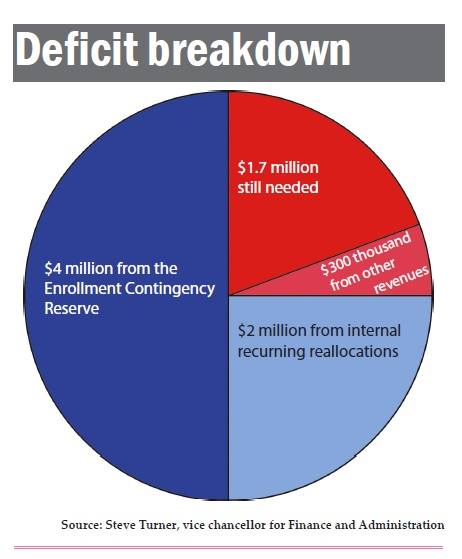Breaking the budget
$8 million deficit expected for PNW in 2017

PNW is expected to incur a deficit of $8 million after failing to meet its $123 million conceptual budget for 2017.
Steve Turner, vice chancellor for Finance and Administration, said PNW is required to submit a balanced budget for a given year based off the previous year’s enrollment, with the greatest portion of the budget coming from student fees while state appropriation fees make up the remainder.
“[The budget] is highly dependent on enrollment. If enrollment changes, the budget changes,” Turner said.
Thomas Keon, PNW chancellor, said that while some departments have had a larger decline in enrollment than others, all have declined to some extent.
“There’s no outline to specify any specific one. Probably the largest has been business and nursing, as far as a percentage,” Keon said.
PNW saw a nine percent decrease in enrollment from Fall 2015 to Fall 2016 and a 10 percent decrease from Spring 2016 to Spring 2017, which contributed to the deficit. Turner said the initial deficit estimate was $6.3 million, which was calculated at the end of the Fall 2016 semester, but there were additional declines which increased it.
“To solve the budget problem is a matter of enrollment, contingency reserves and identifying internal deficiencies – things to tighten up on. What we thought to include in the budget will need to be readjusted, so it’s those three ways we’ll approach it this year,” Turner said. “It’s a matter of concern, but we have solid plans that are efficient and will help us in the future. Not to trivialize it, but we’ll manage it and help the campus move forward.”
Keon said aggressively attempting to increase enrollment is one of PNW’s long-term plans.
“At the beginning of the year I explained that if we could increase retention by 10 percent over a 4-year period we could build up some of what was lost, but that’s a 4-year plan and it assumes we can increase the retention rate,” Keon said. “The good news is that the Fall-Spring retention rate was 87 percent, so hopefully we’ll have a strong Fall-Fall retention rate as well.”
Turner said a number of strategic initiatives to improve enrollment and retention are currently being considered, including tuition strategies to capture additional market share and optimizing classroom utilization.
“Retention includes when courses are offered, but it’s critical because if you don’t lose them you don’t have to get them. It’s far better to keep them and not have to replace them,” Turner said.
Carmen Panlilio, vice chancellor for Enrollment Management and Student Affairs, said retention looks at students who attend PNW to make sure they do not transfer or drop out.
“I worry about everything, but in terms of confidence, I am confident [enrollment/retention] will stabilize,” Panlilio said.
PNW has an allotment of $6.3 million to immediately address the $8 million deficit. With $4 million coming from the Enrollment Contingency Reserve, $2 million from internal recurring reallocations, as well as an additional $300,000, an additional $1.7 million is needed to reach the entirety of the $8 million deficit.
“We keep a savings account to smooth out the bumps and bruises, and the university does keep a reserve for things just like this. We’ve used it before and it’s a necessary and responsible way to prepare for budget years,” Turner said.
One strategy for addressing the additional $1.7 million needed is PNW’s new Early Retirement Incentive Plan for faculty and staff. Keon said the idea is to accept retirements for faculty and staff that are interested and only replace those that absolutely need to be replaced.
“The only way for [the early retirement plan] to translate to savings is if some of the positions are left unfilled. This is optional, but there’s potential savings for where they can be unfilled,” Turner said. “There’s been some discussion of that, but there are clearly some positions which must be filled.”
Turner said PNW joining the Midwest Student Exchange Program is another initiative being considered for the future, which would make it more affordable for out of state students to attend PNW.
“We see a large number of students, such as those from Illinois, attend schools such as those in Wisconsin. So, we want to be a part of that, where we’re a target for students for both those in and out of state,” Turner said.
Panlilio said lessening the gap between in and out of state tuition, which is currently 225 percent higher for out of state students, is one way to reduce the gap and make up for the loss of revenue. She said that can be achieved by joining the Midwest Student Exchange Program or reducing the differential.
“We happen to be blessed to sit in Indiana, but right across the border is Illinois. As part of the Purdue system we will need approval, but we’re not going to abandon our state, that’s why [in state students] will always enjoy [lower tuition].”
PNW is not alone in seeing its budget differentiate from what was projected. Prior to unification, Turner said that both the former Purdue Calumet and Purdue North Central experienced periodic enrollment changes which affected the budgets of the two defunct universities.
“Both campuses have seen smaller and sometimes notable increases in enrollment. Sometimes our projections are not as accurate. I don’t know that unification played a role [in the budget deficit],” Turner said.
Turner said a conceptual budget for 2017-18 has to be submitted by late March or early April of this year.
“To submit a conceptual budget for next month, we’ll be discussing, massaging a budget for the 2017-18 year. We will make adjustments,” Turner said.
In regards to the future financial stability of PNW, Turner said it is not possible to project any future deficits due to the requirement of having to submit a balanced budget.
“It takes a long time for the budget to approve things, especially as a part of a state school like Purdue, so it takes some degree of speculation,” Turner said “I would like to tell you it’s the last time, but I can’t. But I’m very confident we’ll be able to manage it.”



